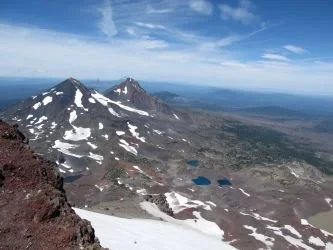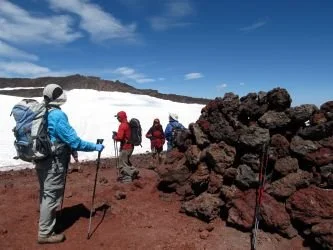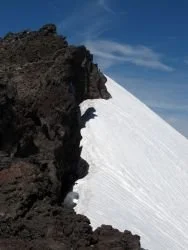Conquest is not a Gift
Dry, cold air, the kind that feels like tiny, sharp teeth whipped up by the wind, nipped at my nose and cheeks that July day.
The 10,358-foot summit of South Sister in central Oregon terminates at a small rock outcrop at the far rim of this sleeping volcano – only a quarter-mile trudge away across the snow-covered frozen Teardrop Pool, a crater lake on top of this mountain. No one in this group I was leading needed a reminder to don their winter clothing. They had already added layers of fleece pullovers, mittens, wool hats, insulated wind pants, and down parkers as the temperature slowly dropped the closer we got to the summit.
South Sister wasn’t a technically difficult mountain to climb, no need for ropes and harnesses, but there were still challenges. The mountain boasts a 4,900-foot elevation gain in 5.5 miles of trail. Volcanic cinder scree covered the steepest parts of the trail, where one literally slips one step back for every two steps forward.
This day was a good day, though. A picture-perfect day. From the south edge of the crater’s rim, Lewis Glacier hugged the side of the mountain. Nearby volcanic mountains, much lower in elevation than South Sister, covered in brilliant white snow fields, looked like frothy ocean waves breaking along the shore.
Standing on the summit of South Sister, I listened to some of the hikers talk about their experiences of looking down on creation, their distant view of a perfect and innocent primordial landscape, a Garden of Eden of sorts. They should be writing pithy sayings for motivational and religious posters, I thought.
What troubled me when I heard that kind of talk is the undercurrent of separation, that we are not of Nature. Instead, we dominate it, celebrating with high-fives after “conquering” South Sister. And I’ve heard it in other situations: toasting with a beer after “beating” Hayden’s Rapids while rafting on Maine’s Dead River, in winning the hundred-dollar purse for catching the largest bass in a summertime fishing tournament, and the rise of “peak bagging” clubs throughout the US.
In leading the hike to the summit of South Sister that day, I had thought assisting others to such soul-stirring vistas would help them to connect. Since then, after many years of leading hikers under the various banners of other organizations into Nature, I’m not sure about that anymore. To most, in my experience, it only helped strengthen their current colonial culture of domination. Perhaps a few did understand that day on South Sister. I suspect they were the ones who stood off in their own silence, looking at the vast world below them, knowing that reaching the summit wasn’t a conquest. It was a gift, and that we were just tiny and insignificant people on a huge mountain, gnats on a giant’s face. An unexpected summer blizzard could have frozen us stiff as logs at no real cost, or care, to the mountain. The silent observers, I believe, got a view that I doubt most of the other hikers ever saw.


